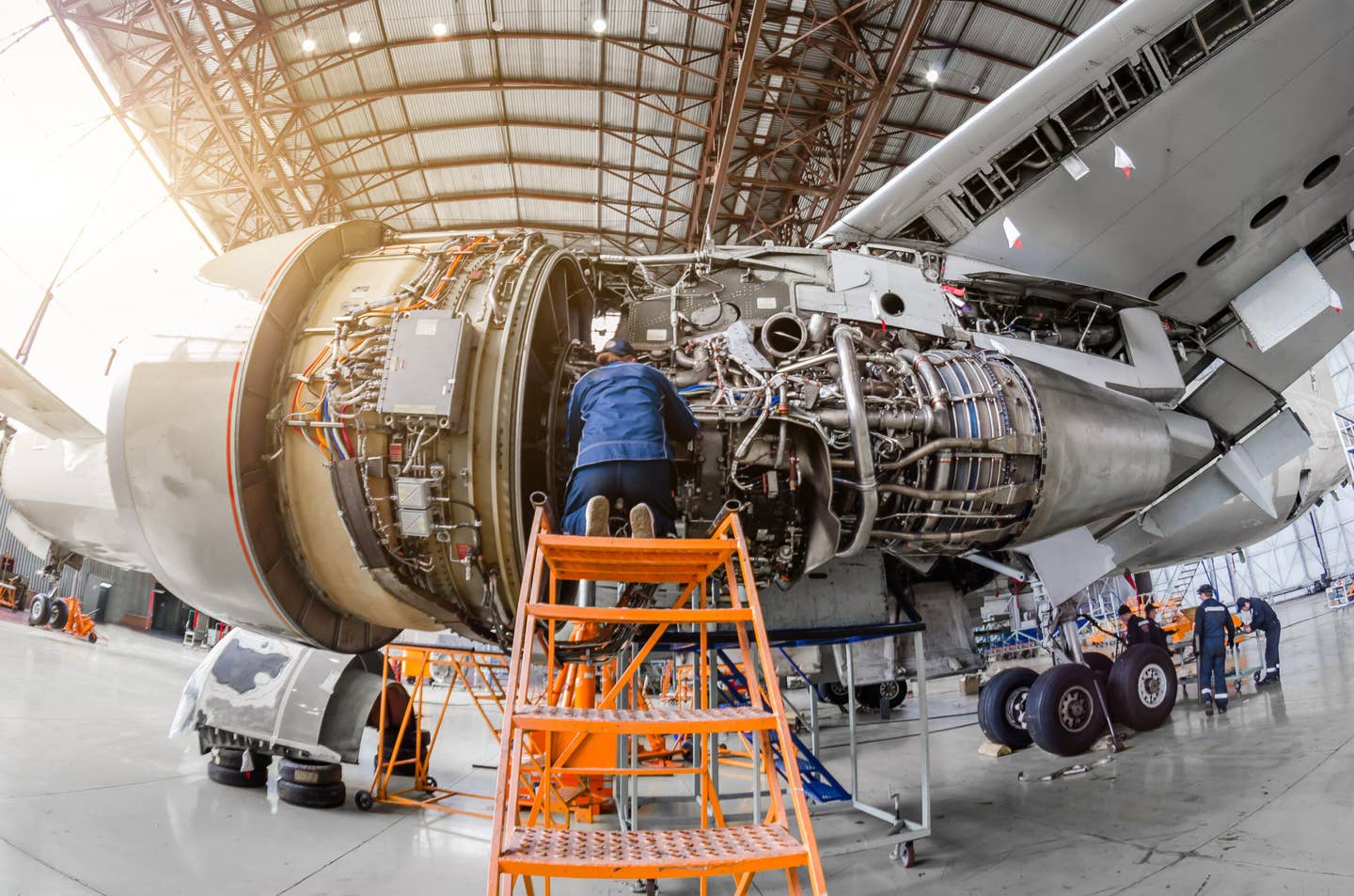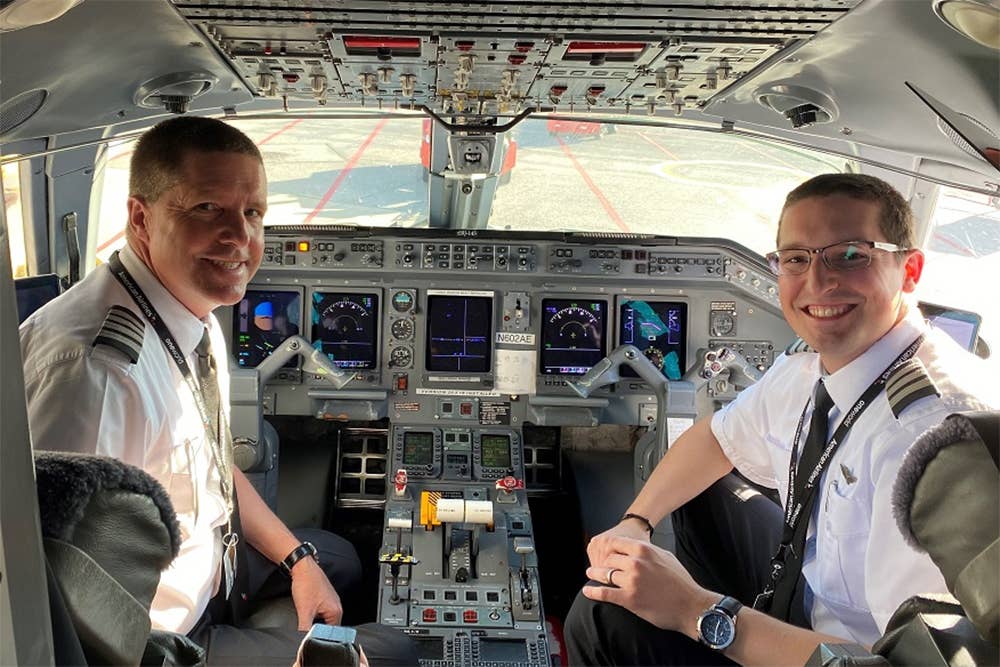Presidents of Regional Airline and Air Line Pilots Associations Argue Over Hours-Reduction Proposal
Scathing letters to each other reveal opposing sides of the debate on how to fix the pilot shortage.

It’s becoming difficult to fill pilot chairs on airline aircraft. Leaders differ on how to fix the problem. [File photo: Shutterstock]
There is a growing tension between two prominent airline industry stakeholders, and based on events this week, it could be a while before things simmer down.
The Air Line Pilots Association International (ALPA) is the largest airline pilot union in the world and represents more than 64,000 pilots at 39 U.S. and Canadian airlines. It has proven to be a powerful advocate for benefits for its pilots, from rest rules to compensation. Separately, the Regional Airlines Association (RAA) represents 17 North American regional airlines and 280 associate and non-airline members. This includes manufacturers of products and services supporting the regional airline industry. Considering that more than 41 percent of all scheduled flights in the U.S. are operated by regional airlines, the people that ALPA and the RAA represent overlap.
In a perfect world, these two organizations should be able to work collectively, but a recent dust-up between the presidents of the two associations shows that a deal could be far off.
ALPA to RAA: ‘Reject This Dangerous Flight Path.’
On Wednesday, ALPA president Joseph DePete fired off a scathing letter to Faye Malarkey Black, president and CEO of RAA, scolding the RAA for some of its recent efforts to address the pilot shortage, and sharing the letter publicly via Twitter.
@ALPAPresident Capt. Joe DePete sent a letter to @RAATweets urging an end to their lobbying efforts to weaken #aviation safety rules for #pilot training & experience. Read the letter: https://t.co/U0JwxN9fsc (1/2) pic.twitter.com/CdTpqigNda
— Air Line Pilots Association (@ALPAPilots) June 15, 2022
"I am writing to urge you to turn your attention away from lobbying to weaken critically important, lifesaving pilot training and experience rules," DePete wrote in the letter. "Instead, focus on helping your member airlines attract and retain the best and brightest aviators."
The RAA has recently campaigned for more inclusive solutions to improve the pilot shortage. One of its claims is that when regional airlines have to cancel routes to small cities because they can’t find pilots to fly their airplanes, it weakens local economies. In alignment with RAA’s proposals, Republic Airways recently petitioned Congress for an exception to the 1,500-hour rule related to the recruitment and hiring of pilots. At the time, it drew the ire of some industry groups, including ALPA, that leveled several charges against Republic, including that the proposal, if approved, would be detrimental to safety.
As then and now, in this letter, DePete maintains that the regional airlines mismanaged resources and federal funding. He said the RAA and its "affiliates squandered the opportunity to ready their operations and training programs for the post-pandemic surge in travel," but instead of owning up to that, they wanted to compromise safety.
"Rather than address the pay, career progression, and work-rule issues faced by many regional pilots," DePete said, "Republic has asked the federal government for permission to cut safety training requirements in half as a way to attract and retain pilots. They want to do this rather than addressing the underlying economic deficiencies of how the airline treats its workers."
It seemed the impetus for DePete's letter came from the recent announcement that ALPA and two regional airlines that operate as American Airlines partners, Piedmont and Envoy, negotiated 50 percent pay increases for their first officers and captains. That pay bump would make those pilots the highest paid at the regional level.
Indeed, while seemingly chest-thumping this news to the RAA, he said, "the recent deals ALPA helped negotiate with two of your members—Envoy and Piedmont—offer a great starting point to seriously address the pilot supply challenges you say your members face."
DePete's closing message to Black was, "I respectfully urge you to reject this dangerous flight path." Instead, for the sake of good business and safety, he said the organization should focus on "coming to the bargaining table ready to negotiate contracts that provide pilots with competitive compensation packages, career progression enhancements, and strengthened work rules."
From one perspective, ALPA's approach has been beneficial to pilots. Its collective bargaining power has ensured pilots' wages have increased while providing other benefits such as rest rules, mental health programs, and other perks. At the same time, its safety claims related to the 1,500 hour don’t tell the whole story.
RAA Responds: ‘ALPA Has Lost Its Way’
Not to be outgunned, Black fired back the next day on the RAA's behalf, saying that ALPA had "lost its way."
Black said in her letter to DePete, "This disgraceful attack represents the latest in ALPA's consistent battle against reality and marks a new low in your war against the regional airlines that employ many of your members and provide the only source of air service for most of the country."
ALPA has maintained that the 1,500-hour rule that Congress enacted after the Colgan Flight 3407 accident has made the skies safer. Black begged to differ, adding nuance to ALPA’s claims, especially regarding the legitimacy that the shift in hiring requirements for pilots from 250 hours to 1,500 hours has actually reduced the accident rate.
"ALPA conflates time building with training," Black said, adding that even ALPA previously held the same position.
"ALPA once agreed with us on the inappropriateness of relying on hours as a proxy for experience," Black explained, referring to a 2010 letter by the union that pointed out that a "high-time" pilot sitting in an airliner could still be "low-experience," especially if most of their time came from flight instructing.
Black went on, surgically, to rebuff other claims ALPA has made in its apparent about-face since its 2010 letter. For instance, she pointed out that ALPA has campaigned on "distorted data" that selectively paints a safety narrative while saying that "every airline CEO who has addressed the pilot shortage is lying…because they want to make aviation less safe."
Moreover, Black took the opportunity to state that ALPA wasn't living up to its stated ideals, which include increasing the supply of diverse pilots into the pipeline. She said every effort to do so has gotten the union's cold shoulder, or as Black puts it, "on Capitol Hill, ALPA has become the party of ‘no.’”
While there is a litany of other concerns she addressed, such as ALPA's position on better financing for students, expanding the retirement age, or even hiring qualified international workers, the most contentious remains ALPA's changing position on the 1,500-hour rule. Black pointed out ALPA's 2010 comment, in which the union said, "We concur with the recent statement by the Flight Safety Foundation that the public deserves ‘a more sophisticated solution’ than a blanket move to 1,500 hours. We believe that the law's flight-hour credit provision is entirely justified based on the quality of experience and not merely quantity of experience."
Nearly a decade after the FAA rule was enacted, there is no consensus that the increase of total time required for pilots, aside from generally being more experienced, directly correlated to safety.
On a more conciliatory note, in her letter’s conclusion, Black called for ALPA and RAA to work together and regroup for the sake of the industry.
"We miss our once strong safety partnership and encourage you to abandon your misleading discourse and ad hominem attacks, roll up your sleeves, and join us in protecting the future of our industry."

Subscribe to Our Newsletter
Get the latest FLYING stories delivered directly to your inbox




